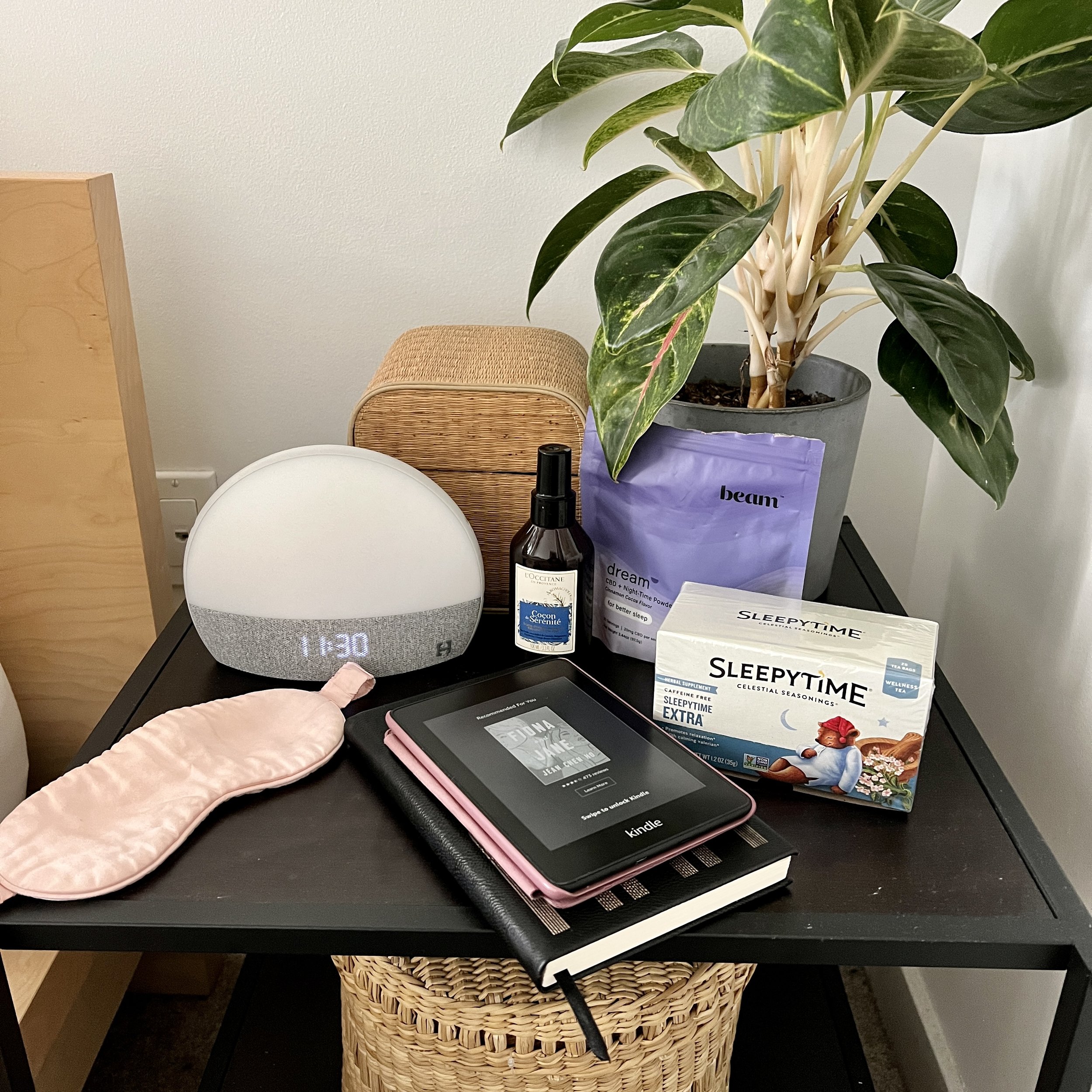Products that Help You Sleep: Blue Sky Mind Picks
My nightstand, ft. some of my favorite products for better sleep.
I slept away from home 16 out of 30 days in May. I was on a travel stint that included a bachelorette in Tulum, a work offsite in NYC, a family reunion in Lake Shasta, and a birthday party in Italy. Are you exhausted yet? I was!
It was an amazing set of experiences that brought new levels of connection within my friendships, my colleagues, and my family. But it came with significant sleep quality challenges.
More than once on my travels, someone would either observe or hear of my nightly bedtime regimen and start asking questions about the products and practices I was using to maintain decent sleep while away from home. At their request, this post was born.
Before we dive in, make sure you’ve read my first post on sleep optimization. In it, I share data-driven findings on what practices and behaviors help me optimize my sleep. It will help contextualize the below routine.
Products that help you sleep
Below are the sleep products that I personally own, use, and love.
At-home bedtime routine & products
Here’s my full, ideal bedtime routine when I’m at home. Does it happen like this every night? Like 1% of the time. But documenting a framework makes it easier to incorporate more pieces than not on a regular basis. One important part of any bedtime routine is flexibility; it’s actually detrimental to become too rigid with it. More on that below.
Here’s my routine, with supporting sleep products:
5:30pm work out, drink electrolytes & shower
Open bedroom window to cool down room for sleep
6:30pm to 7:30pm cook & eat dinner
9pm drink Sleepytime tea and/or Beam Dream sleep powder
9:15pm turn off electronics & stop drinking liquids
Close bedroom window
Get ready for bed
Spray pillow with L'Occitane room spray
9:30pm turn on Hatch sleep machine, pre-programmed for…
5-minute stretch (highly recommend this set of sleep stretches)
20-minute read (my beloved Kindle & Kindle cover)
10-minute meditation
10:30pm fall asleep on my Casper pillow
Traveling bedtime routine products
When traveling, I’m more likely to be drinking alcohol, not working out, eating more indulgently, and going to bed later. All of these things are known to negatively affect my sleep quality. I also don’t usually have much time for a bedtime routine, but I’ll try to do an abbreviated version of stretching & reading. My travel sleep products are about mitigating the negative effects of traveling as much as possible.
Here’s my traveling bedtime routine:
20 minutes before bed, pop either drug-free Unisom gummies, naturopathic Deep Sleep pills, Unisom sleep gells, or an occasional Ambien (Rx only)
Reminder, Ambien should never be taken with alcohol. Since I’m often drinking while traveling, I make sure to have other sleep aids on hand.
Turn on my Sleep Yoga travel-size sound machine, hope for Pavlovian response
Stretch and breathe for 5-10 minutes
Read for 10-20 minutes
Don my Mack’s silicone earplugs and silky sleep mask
Risks with sleep products
By now, you’ll know that I am in no way a licensed healthcare provider. Truly, everyone should speak with their doctor before ingesting any sort of new sleep supplements. Also, this Harvard Health article offers a lot of great info on risks of products like Unisom, Ambient and melatonin.
I speak with my doctor on this topic regularly, because I do have an Ambien prescription for occasional travel-induced insomnia. He’s shed some really interesting light onto how and why sleep supplements (and practices, in general) can be so habit-forming.
According to my doc, Ambien is considered a very safe drug as far as the chemical makeup is concerned. However, it’s regulated so tightly because it is highly “habit-forming.” This means that it targets the GABA receptors in your brain (producing a calming effect) so well that you’re able to fall asleep immediately. The body is quick to habitualize anything that makes sleep come easier. This applies to all products and practices you might use to help you sleep.
When the body habitualizes something and becomes dependent on it, taking them away can cause a withdrawal reaction. This can make traveling difficult, in that you might not have all of your normal supplies and routines that you have at home. You might forget to bring your sleep mask or run out of Deep Sleep pills.
For that reason, I recommend switching your bedtime routine up regularly. Do not follow it religiously. Save the whole shebang for a night when you need to ensure good sleep. Otherwise, it can start to negatively impact you when all of your tools are not at your disposal. Staying flexible will help your sleep be more resilient. Also, you’ll be less annoying on trips with your friends where bedtimes are closer to the sunrise :)
Putting together your own sleep routine
Per my earlier post on sleep optimization, I highly recommend investing in a WHOOP tracker to start to understand your own influential sleep factors. You can’t optimize what you can’t measure, and nothing will make you want to optimize like seeing red scores every night of the weekend.
You can also shop all my favorite sleep products on my Amazon storefront. Note that I’ll make a tiny commission for anything you purchase. As someone who promotes mindfulness and sustainability, I’m conflicted driving my readers to Amazon. At the same time, it makes legitimately helpful products accessible to the masses, and their affiliate program helps support my work financially. I’m working on building out partnerships with more independent brands that align more with my mission and values (I recently started working with Goldune, a dope site for sustainable home goods).
Do you like content on how to optimize your lifestyle for better physical and mental health? Consider subscribing to Blue Sky Mind.
Up Next: My #1 Tip for Happy Travel

